Impact of Australian Laws on BHP Billiton's Business Operations
VerifiedAdded on 2023/01/11
|11
|2701
|52
Report
AI Summary
This report provides an executive summary analyzing the legal and regulatory framework impacting BHP Billiton's operations in Australia. It examines various legislative acts, including tax obligations, the Mining Act 1971, Mines and Works Inspection Act 1920, Fair Works Act 2009, Environment Protection and Biodiversity Conservation Act (EPBC) Act, consumer laws, product safety laws, and the Public and Environmental Health Act 1987. The report also discusses the impact of treaties, conventions, and agreements on BHP Billiton's business, such as royalties, financing, import license agreements, bilateral agreements, the Petroleum Act 2000, and visa agreements. The analysis highlights the complexities of operating as a multinational corporation in Australia and the importance of compliance with both domestic and international legal requirements. The report emphasizes how these legal and regulatory aspects affect BHP Billiton's ability to explore, develop, and process minerals, gas, and oil within the country. It also touches upon the company's dual-listed structure and its implications for tax compliance.
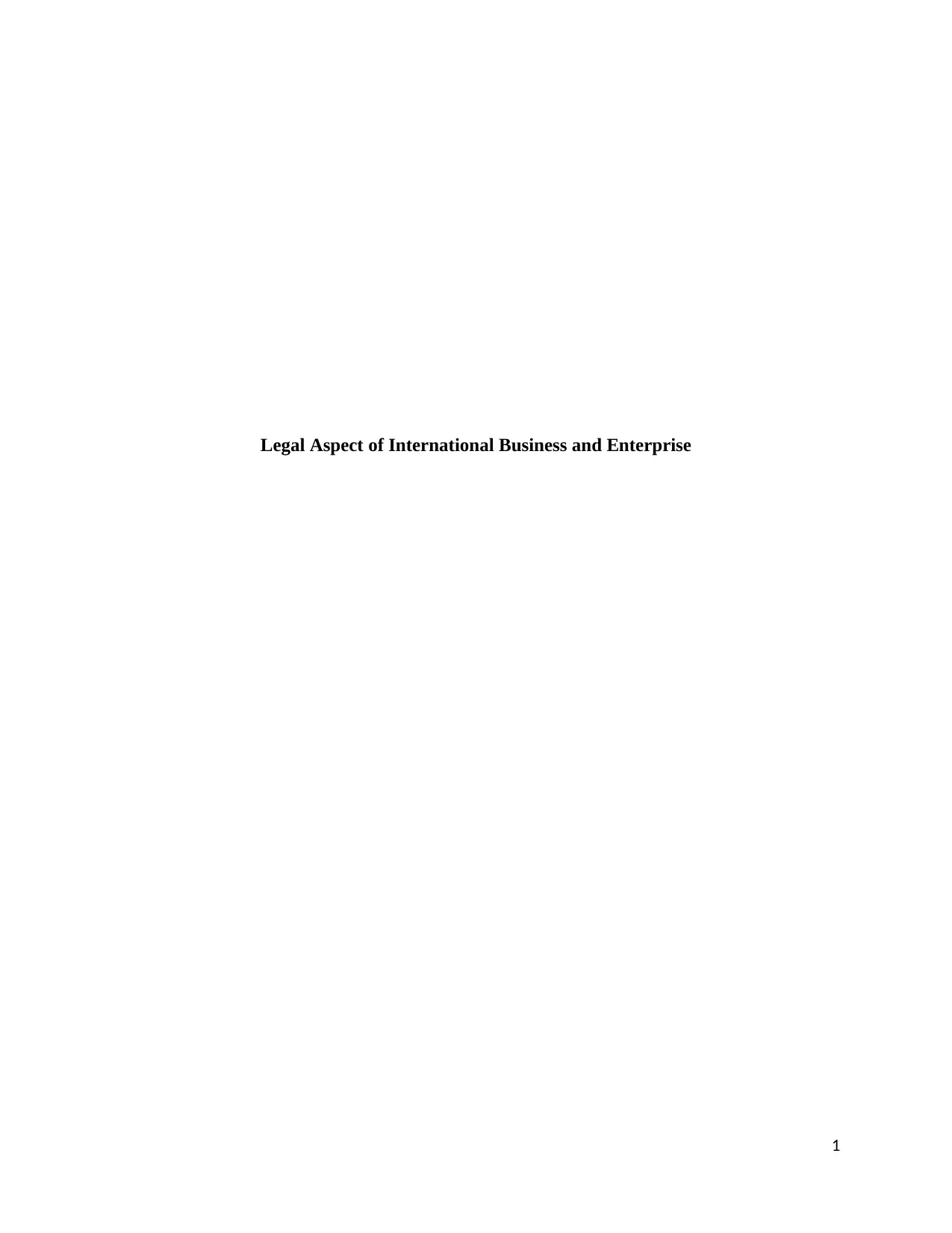
Legal Aspect of International Business and Enterprise
1
1
Paraphrase This Document
Need a fresh take? Get an instant paraphrase of this document with our AI Paraphraser
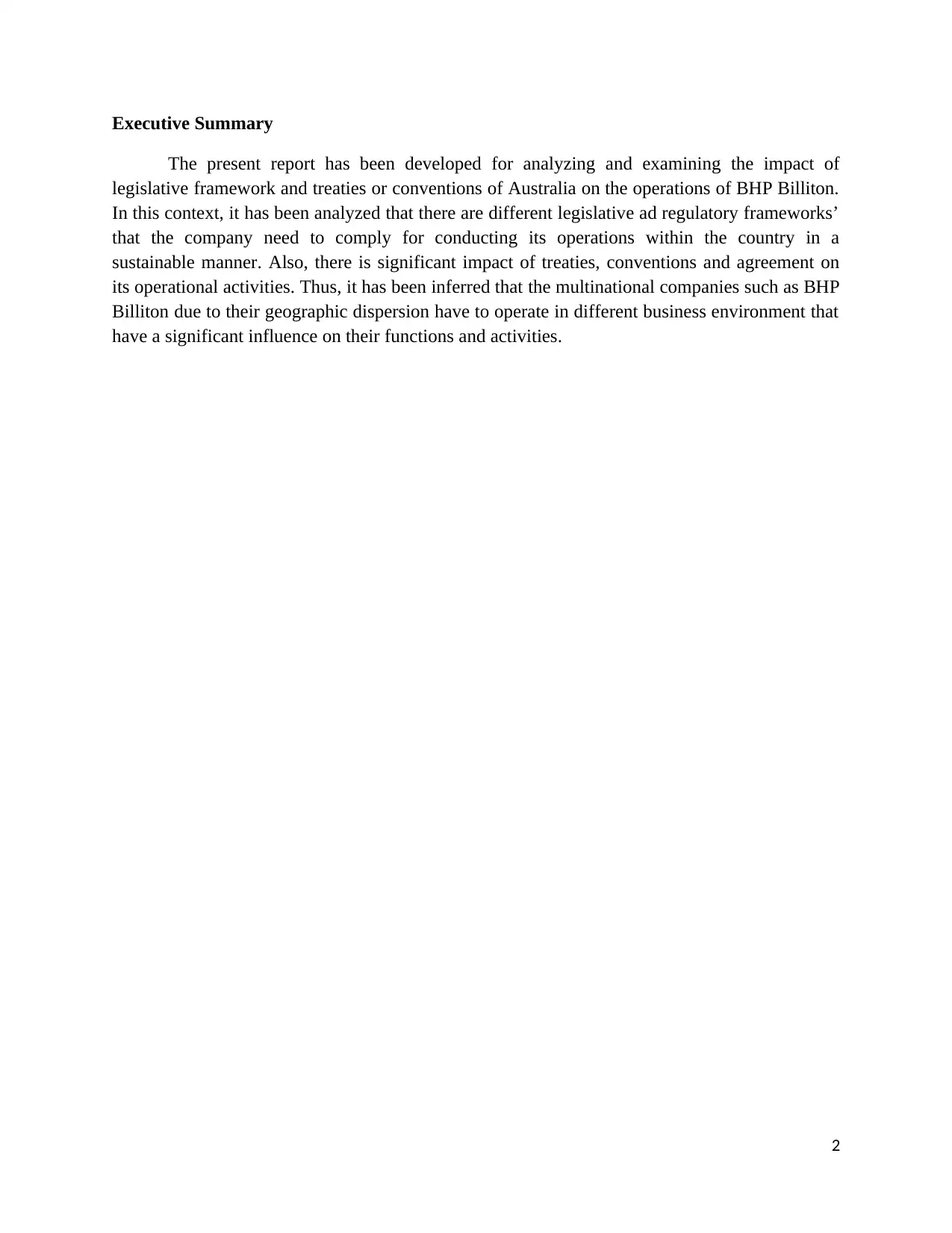
Executive Summary
The present report has been developed for analyzing and examining the impact of
legislative framework and treaties or conventions of Australia on the operations of BHP Billiton.
In this context, it has been analyzed that there are different legislative ad regulatory frameworks’
that the company need to comply for conducting its operations within the country in a
sustainable manner. Also, there is significant impact of treaties, conventions and agreement on
its operational activities. Thus, it has been inferred that the multinational companies such as BHP
Billiton due to their geographic dispersion have to operate in different business environment that
have a significant influence on their functions and activities.
2
The present report has been developed for analyzing and examining the impact of
legislative framework and treaties or conventions of Australia on the operations of BHP Billiton.
In this context, it has been analyzed that there are different legislative ad regulatory frameworks’
that the company need to comply for conducting its operations within the country in a
sustainable manner. Also, there is significant impact of treaties, conventions and agreement on
its operational activities. Thus, it has been inferred that the multinational companies such as BHP
Billiton due to their geographic dispersion have to operate in different business environment that
have a significant influence on their functions and activities.
2
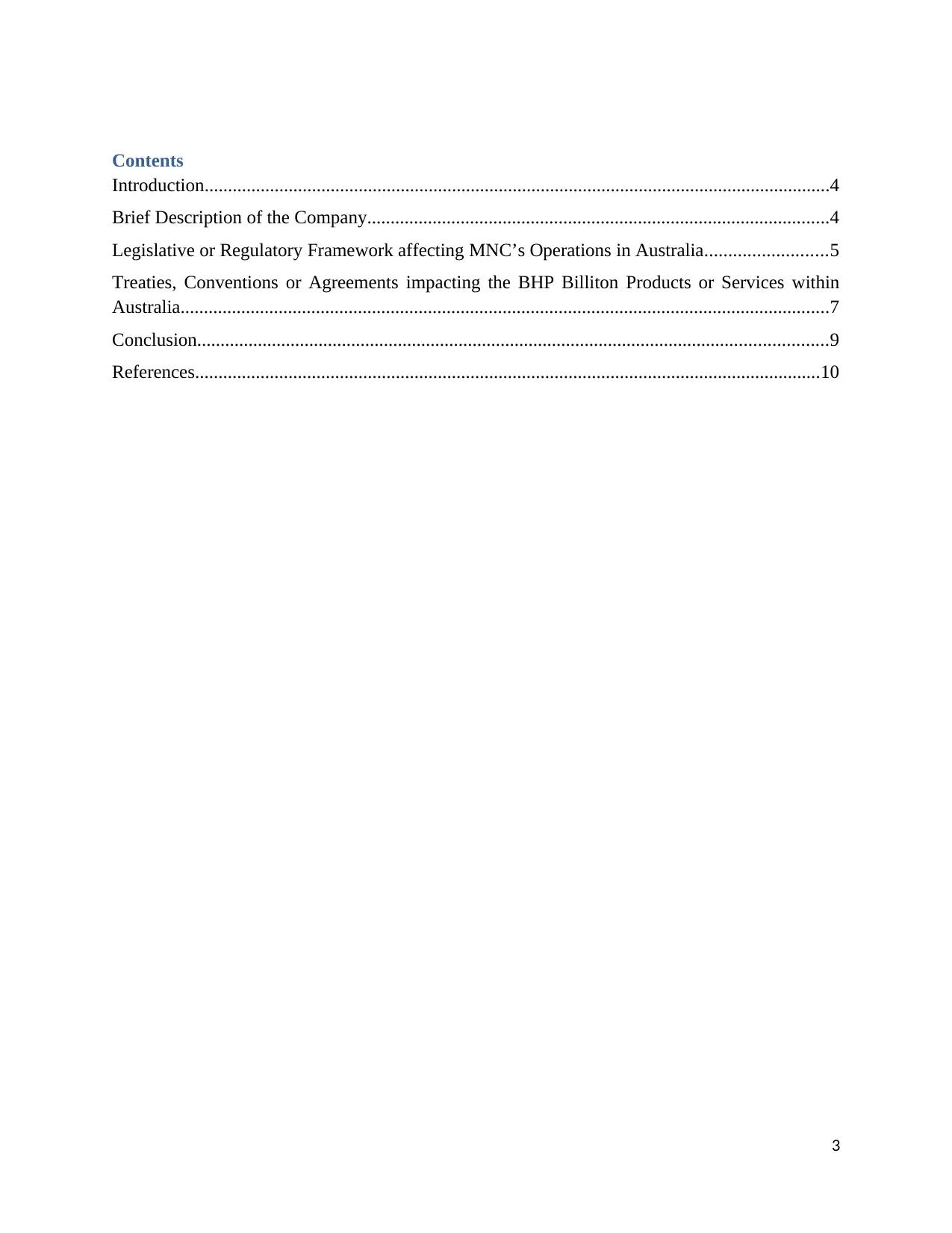
Contents
Introduction......................................................................................................................................4
Brief Description of the Company...................................................................................................4
Legislative or Regulatory Framework affecting MNC’s Operations in Australia..........................5
Treaties, Conventions or Agreements impacting the BHP Billiton Products or Services within
Australia...........................................................................................................................................7
Conclusion.......................................................................................................................................9
References......................................................................................................................................10
3
Introduction......................................................................................................................................4
Brief Description of the Company...................................................................................................4
Legislative or Regulatory Framework affecting MNC’s Operations in Australia..........................5
Treaties, Conventions or Agreements impacting the BHP Billiton Products or Services within
Australia...........................................................................................................................................7
Conclusion.......................................................................................................................................9
References......................................................................................................................................10
3
⊘ This is a preview!⊘
Do you want full access?
Subscribe today to unlock all pages.

Trusted by 1+ million students worldwide
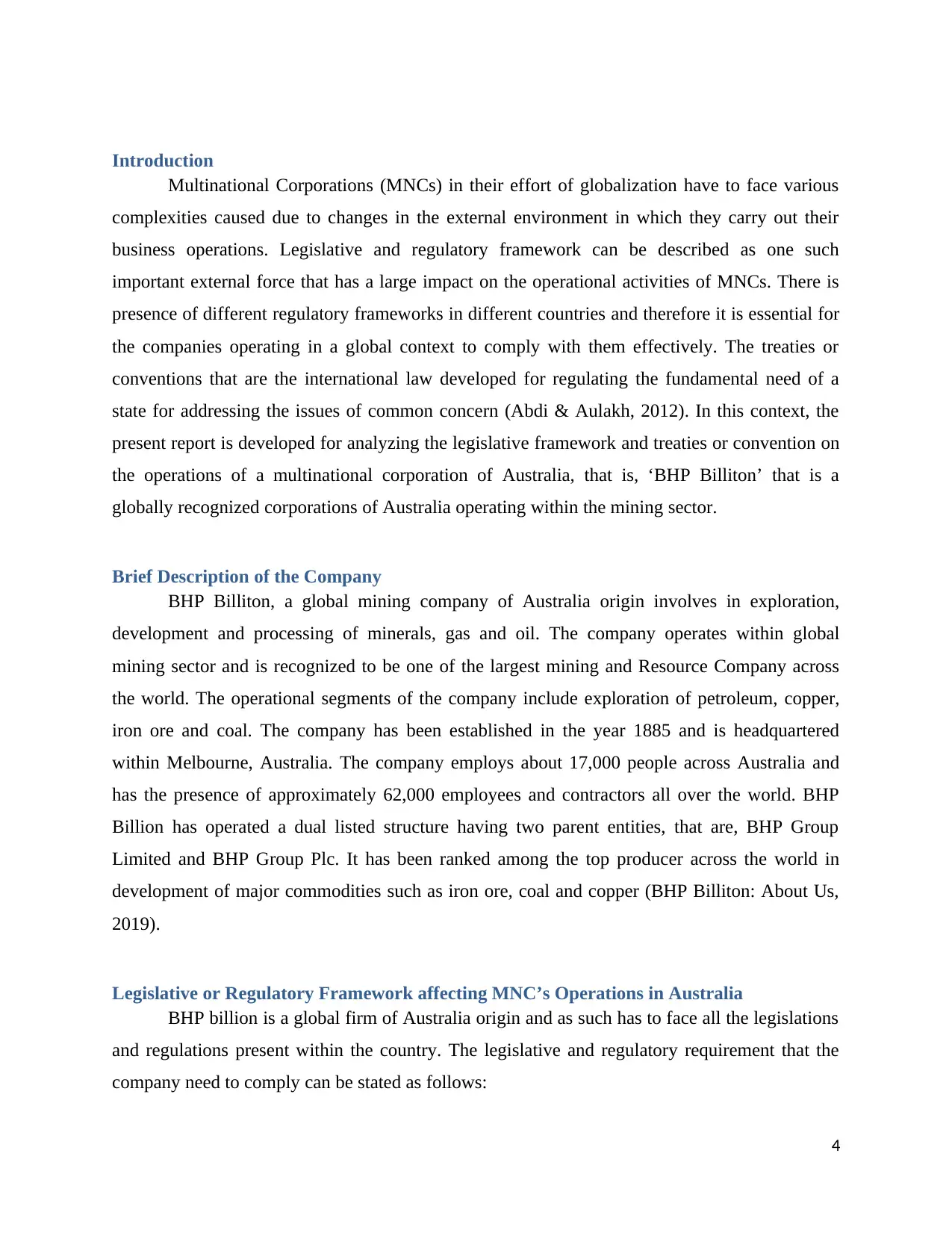
Introduction
Multinational Corporations (MNCs) in their effort of globalization have to face various
complexities caused due to changes in the external environment in which they carry out their
business operations. Legislative and regulatory framework can be described as one such
important external force that has a large impact on the operational activities of MNCs. There is
presence of different regulatory frameworks in different countries and therefore it is essential for
the companies operating in a global context to comply with them effectively. The treaties or
conventions that are the international law developed for regulating the fundamental need of a
state for addressing the issues of common concern (Abdi & Aulakh, 2012). In this context, the
present report is developed for analyzing the legislative framework and treaties or convention on
the operations of a multinational corporation of Australia, that is, ‘BHP Billiton’ that is a
globally recognized corporations of Australia operating within the mining sector.
Brief Description of the Company
BHP Billiton, a global mining company of Australia origin involves in exploration,
development and processing of minerals, gas and oil. The company operates within global
mining sector and is recognized to be one of the largest mining and Resource Company across
the world. The operational segments of the company include exploration of petroleum, copper,
iron ore and coal. The company has been established in the year 1885 and is headquartered
within Melbourne, Australia. The company employs about 17,000 people across Australia and
has the presence of approximately 62,000 employees and contractors all over the world. BHP
Billion has operated a dual listed structure having two parent entities, that are, BHP Group
Limited and BHP Group Plc. It has been ranked among the top producer across the world in
development of major commodities such as iron ore, coal and copper (BHP Billiton: About Us,
2019).
Legislative or Regulatory Framework affecting MNC’s Operations in Australia
BHP billion is a global firm of Australia origin and as such has to face all the legislations
and regulations present within the country. The legislative and regulatory requirement that the
company need to comply can be stated as follows:
4
Multinational Corporations (MNCs) in their effort of globalization have to face various
complexities caused due to changes in the external environment in which they carry out their
business operations. Legislative and regulatory framework can be described as one such
important external force that has a large impact on the operational activities of MNCs. There is
presence of different regulatory frameworks in different countries and therefore it is essential for
the companies operating in a global context to comply with them effectively. The treaties or
conventions that are the international law developed for regulating the fundamental need of a
state for addressing the issues of common concern (Abdi & Aulakh, 2012). In this context, the
present report is developed for analyzing the legislative framework and treaties or convention on
the operations of a multinational corporation of Australia, that is, ‘BHP Billiton’ that is a
globally recognized corporations of Australia operating within the mining sector.
Brief Description of the Company
BHP Billiton, a global mining company of Australia origin involves in exploration,
development and processing of minerals, gas and oil. The company operates within global
mining sector and is recognized to be one of the largest mining and Resource Company across
the world. The operational segments of the company include exploration of petroleum, copper,
iron ore and coal. The company has been established in the year 1885 and is headquartered
within Melbourne, Australia. The company employs about 17,000 people across Australia and
has the presence of approximately 62,000 employees and contractors all over the world. BHP
Billion has operated a dual listed structure having two parent entities, that are, BHP Group
Limited and BHP Group Plc. It has been ranked among the top producer across the world in
development of major commodities such as iron ore, coal and copper (BHP Billiton: About Us,
2019).
Legislative or Regulatory Framework affecting MNC’s Operations in Australia
BHP billion is a global firm of Australia origin and as such has to face all the legislations
and regulations present within the country. The legislative and regulatory requirement that the
company need to comply can be stated as follows:
4
Paraphrase This Document
Need a fresh take? Get an instant paraphrase of this document with our AI Paraphraser
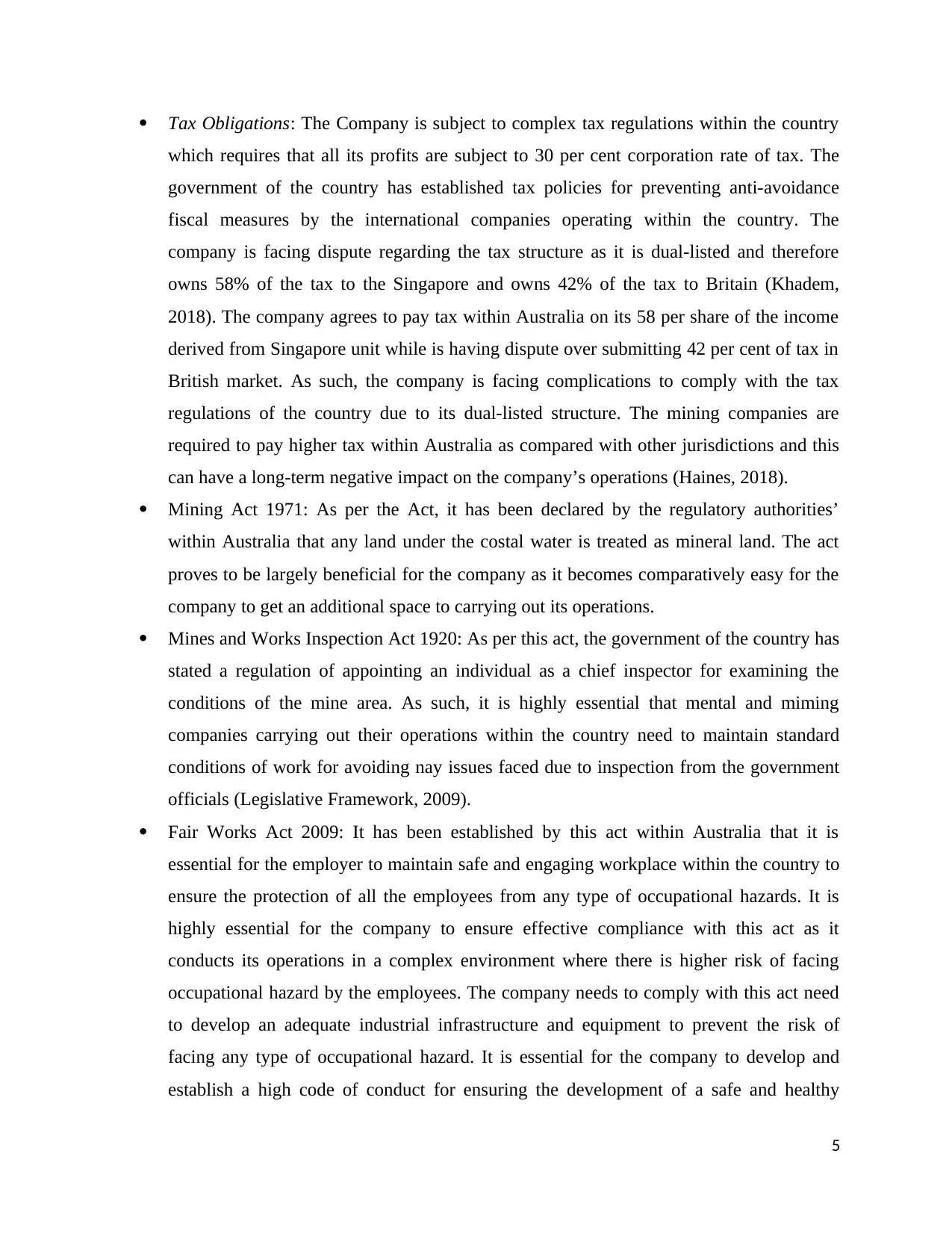
Tax Obligations: The Company is subject to complex tax regulations within the country
which requires that all its profits are subject to 30 per cent corporation rate of tax. The
government of the country has established tax policies for preventing anti-avoidance
fiscal measures by the international companies operating within the country. The
company is facing dispute regarding the tax structure as it is dual-listed and therefore
owns 58% of the tax to the Singapore and owns 42% of the tax to Britain (Khadem,
2018). The company agrees to pay tax within Australia on its 58 per share of the income
derived from Singapore unit while is having dispute over submitting 42 per cent of tax in
British market. As such, the company is facing complications to comply with the tax
regulations of the country due to its dual-listed structure. The mining companies are
required to pay higher tax within Australia as compared with other jurisdictions and this
can have a long-term negative impact on the company’s operations (Haines, 2018).
Mining Act 1971: As per the Act, it has been declared by the regulatory authorities’
within Australia that any land under the costal water is treated as mineral land. The act
proves to be largely beneficial for the company as it becomes comparatively easy for the
company to get an additional space to carrying out its operations.
Mines and Works Inspection Act 1920: As per this act, the government of the country has
stated a regulation of appointing an individual as a chief inspector for examining the
conditions of the mine area. As such, it is highly essential that mental and miming
companies carrying out their operations within the country need to maintain standard
conditions of work for avoiding nay issues faced due to inspection from the government
officials (Legislative Framework, 2009).
Fair Works Act 2009: It has been established by this act within Australia that it is
essential for the employer to maintain safe and engaging workplace within the country to
ensure the protection of all the employees from any type of occupational hazards. It is
highly essential for the company to ensure effective compliance with this act as it
conducts its operations in a complex environment where there is higher risk of facing
occupational hazard by the employees. The company needs to comply with this act need
to develop an adequate industrial infrastructure and equipment to prevent the risk of
facing any type of occupational hazard. It is essential for the company to develop and
establish a high code of conduct for ensuring the development of a safe and healthy
5
which requires that all its profits are subject to 30 per cent corporation rate of tax. The
government of the country has established tax policies for preventing anti-avoidance
fiscal measures by the international companies operating within the country. The
company is facing dispute regarding the tax structure as it is dual-listed and therefore
owns 58% of the tax to the Singapore and owns 42% of the tax to Britain (Khadem,
2018). The company agrees to pay tax within Australia on its 58 per share of the income
derived from Singapore unit while is having dispute over submitting 42 per cent of tax in
British market. As such, the company is facing complications to comply with the tax
regulations of the country due to its dual-listed structure. The mining companies are
required to pay higher tax within Australia as compared with other jurisdictions and this
can have a long-term negative impact on the company’s operations (Haines, 2018).
Mining Act 1971: As per the Act, it has been declared by the regulatory authorities’
within Australia that any land under the costal water is treated as mineral land. The act
proves to be largely beneficial for the company as it becomes comparatively easy for the
company to get an additional space to carrying out its operations.
Mines and Works Inspection Act 1920: As per this act, the government of the country has
stated a regulation of appointing an individual as a chief inspector for examining the
conditions of the mine area. As such, it is highly essential that mental and miming
companies carrying out their operations within the country need to maintain standard
conditions of work for avoiding nay issues faced due to inspection from the government
officials (Legislative Framework, 2009).
Fair Works Act 2009: It has been established by this act within Australia that it is
essential for the employer to maintain safe and engaging workplace within the country to
ensure the protection of all the employees from any type of occupational hazards. It is
highly essential for the company to ensure effective compliance with this act as it
conducts its operations in a complex environment where there is higher risk of facing
occupational hazard by the employees. The company needs to comply with this act need
to develop an adequate industrial infrastructure and equipment to prevent the risk of
facing any type of occupational hazard. It is essential for the company to develop and
establish a high code of conduct for ensuring the development of a safe and healthy
5
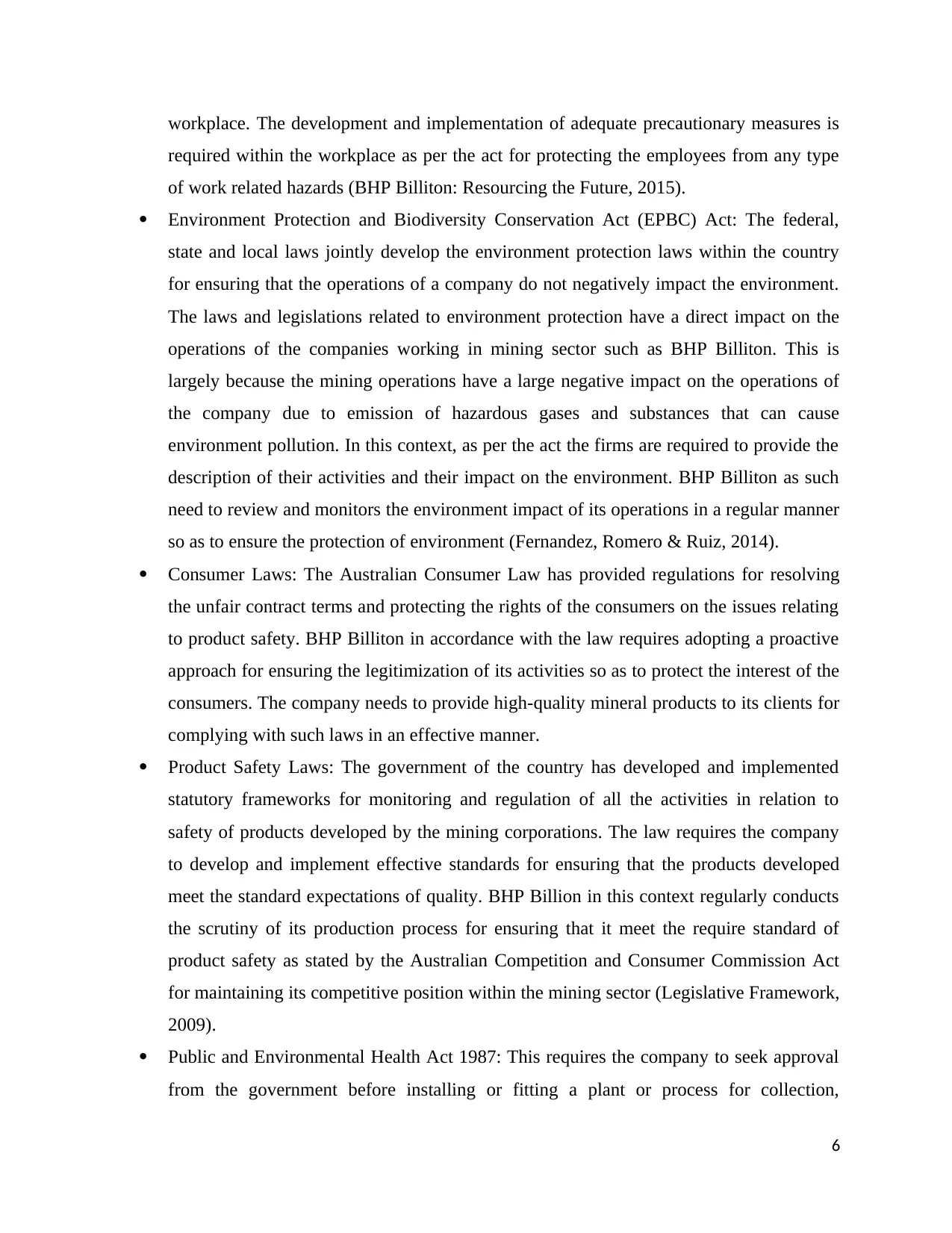
workplace. The development and implementation of adequate precautionary measures is
required within the workplace as per the act for protecting the employees from any type
of work related hazards (BHP Billiton: Resourcing the Future, 2015).
Environment Protection and Biodiversity Conservation Act (EPBC) Act: The federal,
state and local laws jointly develop the environment protection laws within the country
for ensuring that the operations of a company do not negatively impact the environment.
The laws and legislations related to environment protection have a direct impact on the
operations of the companies working in mining sector such as BHP Billiton. This is
largely because the mining operations have a large negative impact on the operations of
the company due to emission of hazardous gases and substances that can cause
environment pollution. In this context, as per the act the firms are required to provide the
description of their activities and their impact on the environment. BHP Billiton as such
need to review and monitors the environment impact of its operations in a regular manner
so as to ensure the protection of environment (Fernandez, Romero & Ruiz, 2014).
Consumer Laws: The Australian Consumer Law has provided regulations for resolving
the unfair contract terms and protecting the rights of the consumers on the issues relating
to product safety. BHP Billiton in accordance with the law requires adopting a proactive
approach for ensuring the legitimization of its activities so as to protect the interest of the
consumers. The company needs to provide high-quality mineral products to its clients for
complying with such laws in an effective manner.
Product Safety Laws: The government of the country has developed and implemented
statutory frameworks for monitoring and regulation of all the activities in relation to
safety of products developed by the mining corporations. The law requires the company
to develop and implement effective standards for ensuring that the products developed
meet the standard expectations of quality. BHP Billion in this context regularly conducts
the scrutiny of its production process for ensuring that it meet the require standard of
product safety as stated by the Australian Competition and Consumer Commission Act
for maintaining its competitive position within the mining sector (Legislative Framework,
2009).
Public and Environmental Health Act 1987: This requires the company to seek approval
from the government before installing or fitting a plant or process for collection,
6
required within the workplace as per the act for protecting the employees from any type
of work related hazards (BHP Billiton: Resourcing the Future, 2015).
Environment Protection and Biodiversity Conservation Act (EPBC) Act: The federal,
state and local laws jointly develop the environment protection laws within the country
for ensuring that the operations of a company do not negatively impact the environment.
The laws and legislations related to environment protection have a direct impact on the
operations of the companies working in mining sector such as BHP Billiton. This is
largely because the mining operations have a large negative impact on the operations of
the company due to emission of hazardous gases and substances that can cause
environment pollution. In this context, as per the act the firms are required to provide the
description of their activities and their impact on the environment. BHP Billiton as such
need to review and monitors the environment impact of its operations in a regular manner
so as to ensure the protection of environment (Fernandez, Romero & Ruiz, 2014).
Consumer Laws: The Australian Consumer Law has provided regulations for resolving
the unfair contract terms and protecting the rights of the consumers on the issues relating
to product safety. BHP Billiton in accordance with the law requires adopting a proactive
approach for ensuring the legitimization of its activities so as to protect the interest of the
consumers. The company needs to provide high-quality mineral products to its clients for
complying with such laws in an effective manner.
Product Safety Laws: The government of the country has developed and implemented
statutory frameworks for monitoring and regulation of all the activities in relation to
safety of products developed by the mining corporations. The law requires the company
to develop and implement effective standards for ensuring that the products developed
meet the standard expectations of quality. BHP Billion in this context regularly conducts
the scrutiny of its production process for ensuring that it meet the require standard of
product safety as stated by the Australian Competition and Consumer Commission Act
for maintaining its competitive position within the mining sector (Legislative Framework,
2009).
Public and Environmental Health Act 1987: This requires the company to seek approval
from the government before installing or fitting a plant or process for collection,
6
⊘ This is a preview!⊘
Do you want full access?
Subscribe today to unlock all pages.

Trusted by 1+ million students worldwide
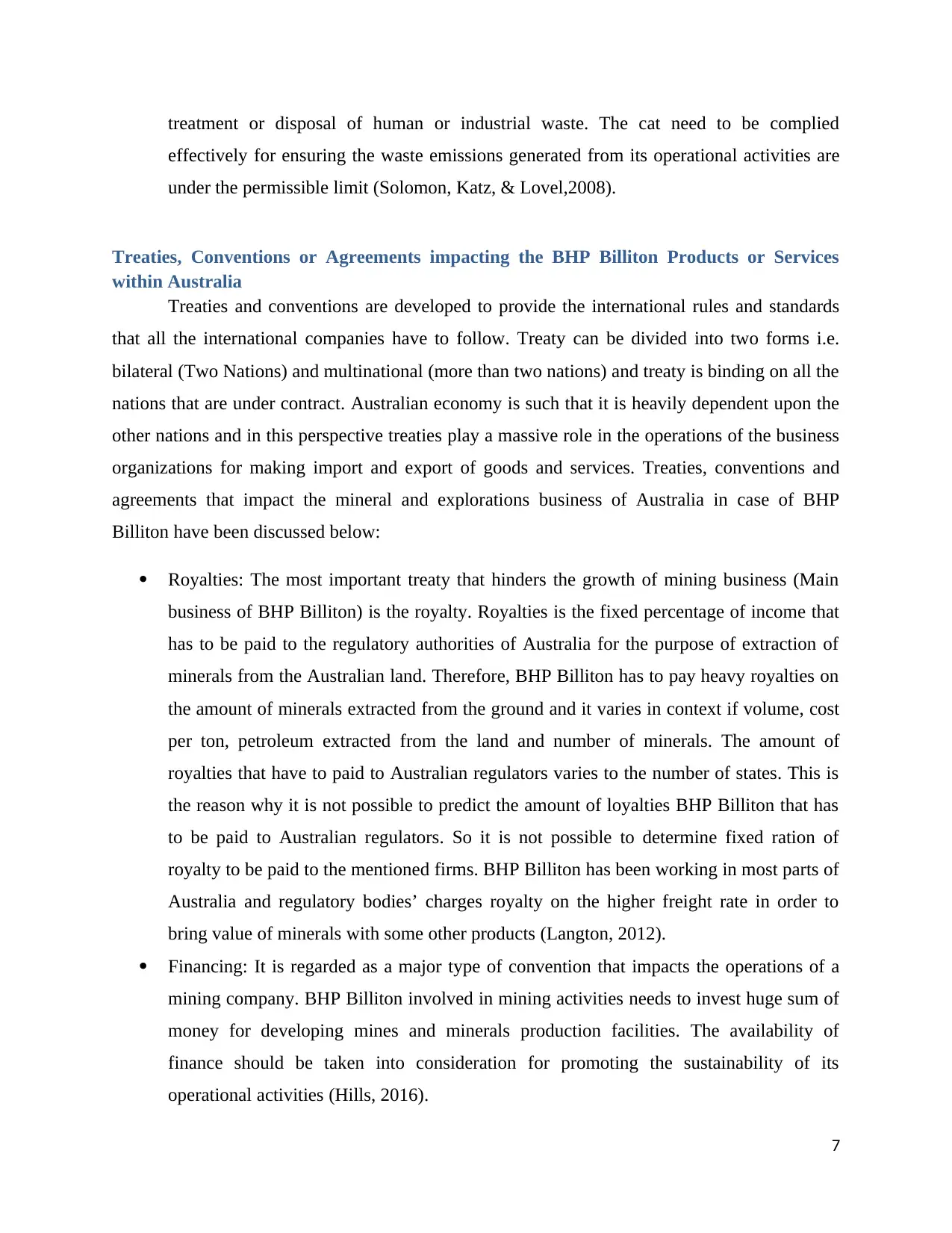
treatment or disposal of human or industrial waste. The cat need to be complied
effectively for ensuring the waste emissions generated from its operational activities are
under the permissible limit (Solomon, Katz, & Lovel,2008).
Treaties, Conventions or Agreements impacting the BHP Billiton Products or Services
within Australia
Treaties and conventions are developed to provide the international rules and standards
that all the international companies have to follow. Treaty can be divided into two forms i.e.
bilateral (Two Nations) and multinational (more than two nations) and treaty is binding on all the
nations that are under contract. Australian economy is such that it is heavily dependent upon the
other nations and in this perspective treaties play a massive role in the operations of the business
organizations for making import and export of goods and services. Treaties, conventions and
agreements that impact the mineral and explorations business of Australia in case of BHP
Billiton have been discussed below:
Royalties: The most important treaty that hinders the growth of mining business (Main
business of BHP Billiton) is the royalty. Royalties is the fixed percentage of income that
has to be paid to the regulatory authorities of Australia for the purpose of extraction of
minerals from the Australian land. Therefore, BHP Billiton has to pay heavy royalties on
the amount of minerals extracted from the ground and it varies in context if volume, cost
per ton, petroleum extracted from the land and number of minerals. The amount of
royalties that have to paid to Australian regulators varies to the number of states. This is
the reason why it is not possible to predict the amount of loyalties BHP Billiton that has
to be paid to Australian regulators. So it is not possible to determine fixed ration of
royalty to be paid to the mentioned firms. BHP Billiton has been working in most parts of
Australia and regulatory bodies’ charges royalty on the higher freight rate in order to
bring value of minerals with some other products (Langton, 2012).
Financing: It is regarded as a major type of convention that impacts the operations of a
mining company. BHP Billiton involved in mining activities needs to invest huge sum of
money for developing mines and minerals production facilities. The availability of
finance should be taken into consideration for promoting the sustainability of its
operational activities (Hills, 2016).
7
effectively for ensuring the waste emissions generated from its operational activities are
under the permissible limit (Solomon, Katz, & Lovel,2008).
Treaties, Conventions or Agreements impacting the BHP Billiton Products or Services
within Australia
Treaties and conventions are developed to provide the international rules and standards
that all the international companies have to follow. Treaty can be divided into two forms i.e.
bilateral (Two Nations) and multinational (more than two nations) and treaty is binding on all the
nations that are under contract. Australian economy is such that it is heavily dependent upon the
other nations and in this perspective treaties play a massive role in the operations of the business
organizations for making import and export of goods and services. Treaties, conventions and
agreements that impact the mineral and explorations business of Australia in case of BHP
Billiton have been discussed below:
Royalties: The most important treaty that hinders the growth of mining business (Main
business of BHP Billiton) is the royalty. Royalties is the fixed percentage of income that
has to be paid to the regulatory authorities of Australia for the purpose of extraction of
minerals from the Australian land. Therefore, BHP Billiton has to pay heavy royalties on
the amount of minerals extracted from the ground and it varies in context if volume, cost
per ton, petroleum extracted from the land and number of minerals. The amount of
royalties that have to paid to Australian regulators varies to the number of states. This is
the reason why it is not possible to predict the amount of loyalties BHP Billiton that has
to be paid to Australian regulators. So it is not possible to determine fixed ration of
royalty to be paid to the mentioned firms. BHP Billiton has been working in most parts of
Australia and regulatory bodies’ charges royalty on the higher freight rate in order to
bring value of minerals with some other products (Langton, 2012).
Financing: It is regarded as a major type of convention that impacts the operations of a
mining company. BHP Billiton involved in mining activities needs to invest huge sum of
money for developing mines and minerals production facilities. The availability of
finance should be taken into consideration for promoting the sustainability of its
operational activities (Hills, 2016).
7
Paraphrase This Document
Need a fresh take? Get an instant paraphrase of this document with our AI Paraphraser

Import License Agreement: It is required by BHP Billiton to import a license for using
heavy mining machines from the regulatory authorities. The company needs to comply
with all the terms and conditions for using the heavy machines (Appiah-Adu, 2013).
Bilateral Agreements: There exist bilateral agreement between Australia and
multinational companies for gaining access to tax exemption and entry into a foreign
market. These are regarded as free trade agreements that promote the international
expansion of the firms operating within Australia. This enables the multinational entities
to carry out their operations within Australia with reduction in the barriers of trade such
as import quotas and tariffs. The reduced barrier of trade that the products or services
developed within Australia by BHP Billiton are easily transferrable to the foreign
locations that helps in improving its profitability and growth. The minimization of duties
of custom and trade quotas enables in fostering the flow of goods and services within and
outside Australia.
Petroleum Act 2000: BHP Billiton is required to continually review its license for
exploration and accessing f petroleum and other resources to which the act is applicable.
The compliance with the act ensures to minimize environmental damage and ensuring
secure supply of the petroleum and other minerals. The company is required to gain
license for operating petroleum pipeline or other minerals as stated by the act (Lockie, &
Franetovich, 2008).
Visa Agreement: The Company conducts its operations on the global scale and therefore
recruit workers from all over the world have excellent skills and competencies. However.
In this context, it is essential for the company to comply with visa restrictions imposed by
the federal government (Abdi & Aulakh, 2012).
Conclusion
The overall analysis has depicted the importance of regulatory framework and treaties
and conventions on the operational activities of the mining company such as BHP Billiton. The
company is regarded to comply with rules and regulations implemented by the government of the
country for ensuring carrying out its operations in a sustainable manner. The regulations and
legislations such as environment protection, workplace and consumer laws and others are
required to be effectively complied with BHP Billiton. In addition to this, treaties, conventions
8
heavy mining machines from the regulatory authorities. The company needs to comply
with all the terms and conditions for using the heavy machines (Appiah-Adu, 2013).
Bilateral Agreements: There exist bilateral agreement between Australia and
multinational companies for gaining access to tax exemption and entry into a foreign
market. These are regarded as free trade agreements that promote the international
expansion of the firms operating within Australia. This enables the multinational entities
to carry out their operations within Australia with reduction in the barriers of trade such
as import quotas and tariffs. The reduced barrier of trade that the products or services
developed within Australia by BHP Billiton are easily transferrable to the foreign
locations that helps in improving its profitability and growth. The minimization of duties
of custom and trade quotas enables in fostering the flow of goods and services within and
outside Australia.
Petroleum Act 2000: BHP Billiton is required to continually review its license for
exploration and accessing f petroleum and other resources to which the act is applicable.
The compliance with the act ensures to minimize environmental damage and ensuring
secure supply of the petroleum and other minerals. The company is required to gain
license for operating petroleum pipeline or other minerals as stated by the act (Lockie, &
Franetovich, 2008).
Visa Agreement: The Company conducts its operations on the global scale and therefore
recruit workers from all over the world have excellent skills and competencies. However.
In this context, it is essential for the company to comply with visa restrictions imposed by
the federal government (Abdi & Aulakh, 2012).
Conclusion
The overall analysis has depicted the importance of regulatory framework and treaties
and conventions on the operational activities of the mining company such as BHP Billiton. The
company is regarded to comply with rules and regulations implemented by the government of the
country for ensuring carrying out its operations in a sustainable manner. The regulations and
legislations such as environment protection, workplace and consumer laws and others are
required to be effectively complied with BHP Billiton. In addition to this, treaties, conventions
8

and agreement such as royalties, bilateral agreements and there also need to be complied in an
adequate manner.
9
adequate manner.
9
⊘ This is a preview!⊘
Do you want full access?
Subscribe today to unlock all pages.

Trusted by 1+ million students worldwide
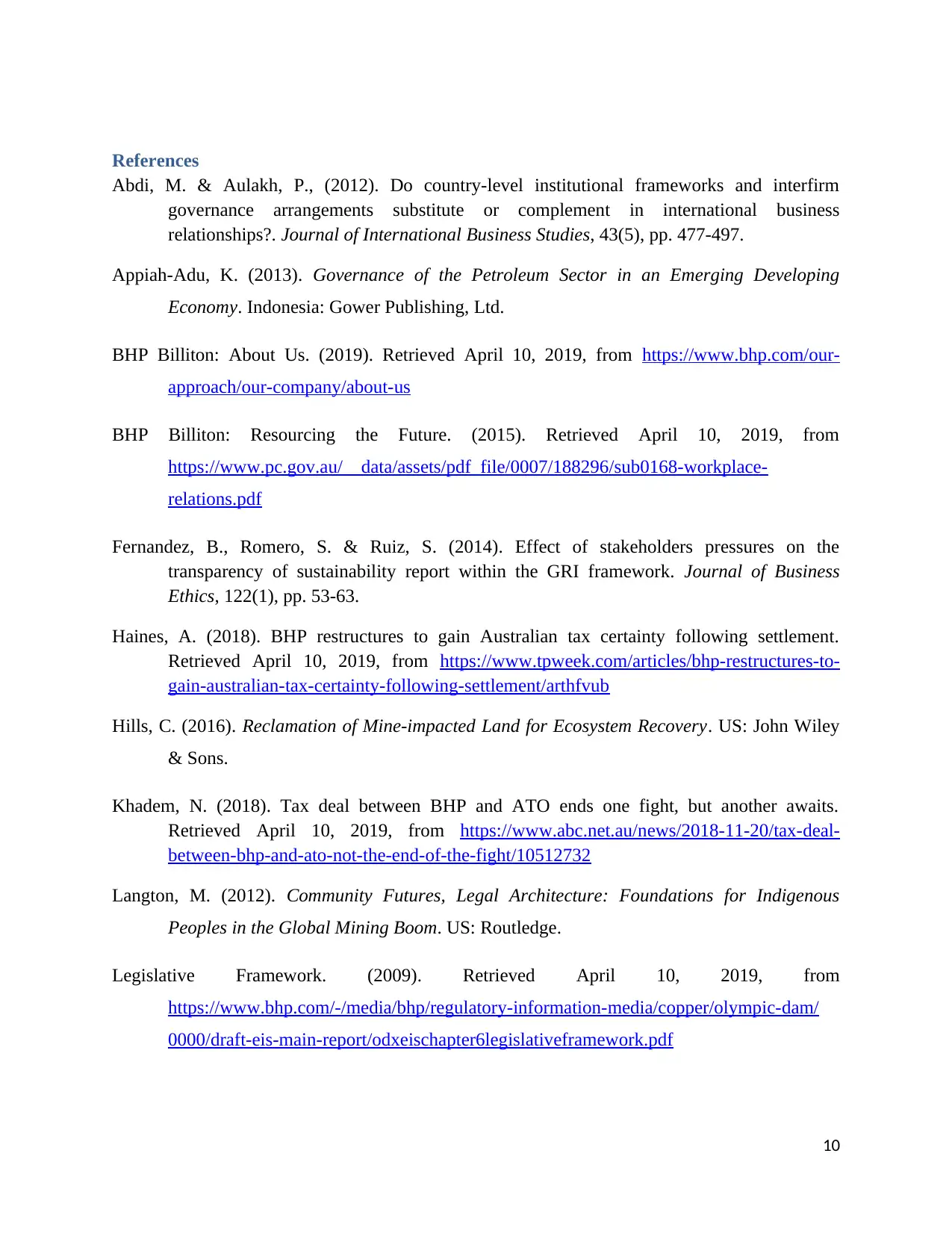
References
Abdi, M. & Aulakh, P., (2012). Do country-level institutional frameworks and interfirm
governance arrangements substitute or complement in international business
relationships?. Journal of International Business Studies, 43(5), pp. 477-497.
Appiah-Adu, K. (2013). Governance of the Petroleum Sector in an Emerging Developing
Economy. Indonesia: Gower Publishing, Ltd.
BHP Billiton: About Us. (2019). Retrieved April 10, 2019, from https://www.bhp.com/our-
approach/our-company/about-us
BHP Billiton: Resourcing the Future. (2015). Retrieved April 10, 2019, from
https://www.pc.gov.au/__data/assets/pdf_file/0007/188296/sub0168-workplace-
relations.pdf
Fernandez, B., Romero, S. & Ruiz, S. (2014). Effect of stakeholders pressures on the
transparency of sustainability report within the GRI framework. Journal of Business
Ethics, 122(1), pp. 53-63.
Haines, A. (2018). BHP restructures to gain Australian tax certainty following settlement.
Retrieved April 10, 2019, from https://www.tpweek.com/articles/bhp-restructures-to-
gain-australian-tax-certainty-following-settlement/arthfvub
Hills, C. (2016). Reclamation of Mine-impacted Land for Ecosystem Recovery. US: John Wiley
& Sons.
Khadem, N. (2018). Tax deal between BHP and ATO ends one fight, but another awaits.
Retrieved April 10, 2019, from https://www.abc.net.au/news/2018-11-20/tax-deal-
between-bhp-and-ato-not-the-end-of-the-fight/10512732
Langton, M. (2012). Community Futures, Legal Architecture: Foundations for Indigenous
Peoples in the Global Mining Boom. US: Routledge.
Legislative Framework. (2009). Retrieved April 10, 2019, from
https://www.bhp.com/-/media/bhp/regulatory-information-media/copper/olympic-dam/
0000/draft-eis-main-report/odxeischapter6legislativeframework.pdf
10
Abdi, M. & Aulakh, P., (2012). Do country-level institutional frameworks and interfirm
governance arrangements substitute or complement in international business
relationships?. Journal of International Business Studies, 43(5), pp. 477-497.
Appiah-Adu, K. (2013). Governance of the Petroleum Sector in an Emerging Developing
Economy. Indonesia: Gower Publishing, Ltd.
BHP Billiton: About Us. (2019). Retrieved April 10, 2019, from https://www.bhp.com/our-
approach/our-company/about-us
BHP Billiton: Resourcing the Future. (2015). Retrieved April 10, 2019, from
https://www.pc.gov.au/__data/assets/pdf_file/0007/188296/sub0168-workplace-
relations.pdf
Fernandez, B., Romero, S. & Ruiz, S. (2014). Effect of stakeholders pressures on the
transparency of sustainability report within the GRI framework. Journal of Business
Ethics, 122(1), pp. 53-63.
Haines, A. (2018). BHP restructures to gain Australian tax certainty following settlement.
Retrieved April 10, 2019, from https://www.tpweek.com/articles/bhp-restructures-to-
gain-australian-tax-certainty-following-settlement/arthfvub
Hills, C. (2016). Reclamation of Mine-impacted Land for Ecosystem Recovery. US: John Wiley
& Sons.
Khadem, N. (2018). Tax deal between BHP and ATO ends one fight, but another awaits.
Retrieved April 10, 2019, from https://www.abc.net.au/news/2018-11-20/tax-deal-
between-bhp-and-ato-not-the-end-of-the-fight/10512732
Langton, M. (2012). Community Futures, Legal Architecture: Foundations for Indigenous
Peoples in the Global Mining Boom. US: Routledge.
Legislative Framework. (2009). Retrieved April 10, 2019, from
https://www.bhp.com/-/media/bhp/regulatory-information-media/copper/olympic-dam/
0000/draft-eis-main-report/odxeischapter6legislativeframework.pdf
10
Paraphrase This Document
Need a fresh take? Get an instant paraphrase of this document with our AI Paraphraser
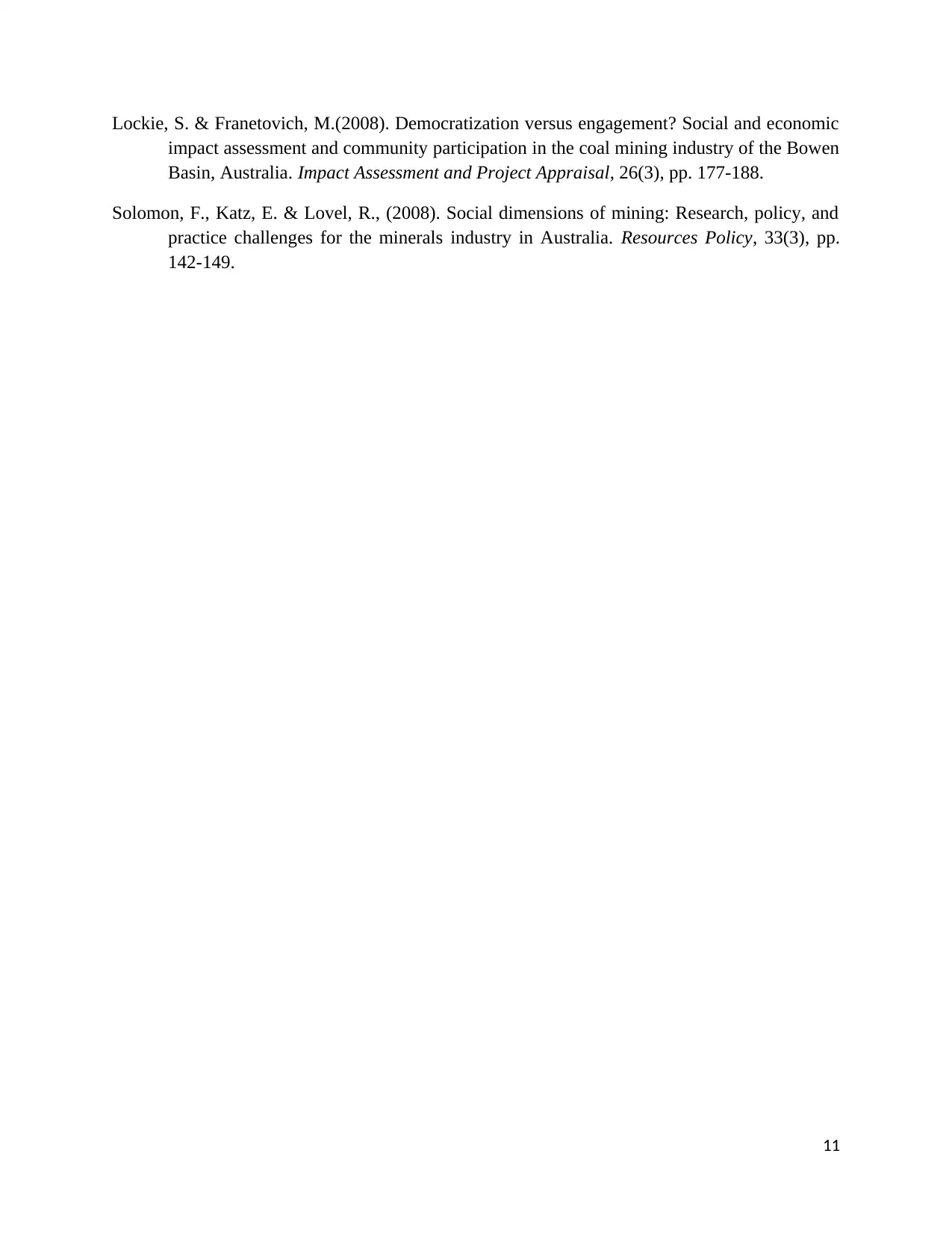
Lockie, S. & Franetovich, M.(2008). Democratization versus engagement? Social and economic
impact assessment and community participation in the coal mining industry of the Bowen
Basin, Australia. Impact Assessment and Project Appraisal, 26(3), pp. 177-188.
Solomon, F., Katz, E. & Lovel, R., (2008). Social dimensions of mining: Research, policy, and
practice challenges for the minerals industry in Australia. Resources Policy, 33(3), pp.
142-149.
11
impact assessment and community participation in the coal mining industry of the Bowen
Basin, Australia. Impact Assessment and Project Appraisal, 26(3), pp. 177-188.
Solomon, F., Katz, E. & Lovel, R., (2008). Social dimensions of mining: Research, policy, and
practice challenges for the minerals industry in Australia. Resources Policy, 33(3), pp.
142-149.
11
1 out of 11
Related Documents
Your All-in-One AI-Powered Toolkit for Academic Success.
+13062052269
info@desklib.com
Available 24*7 on WhatsApp / Email
![[object Object]](/_next/static/media/star-bottom.7253800d.svg)
Unlock your academic potential
Copyright © 2020–2026 A2Z Services. All Rights Reserved. Developed and managed by ZUCOL.




